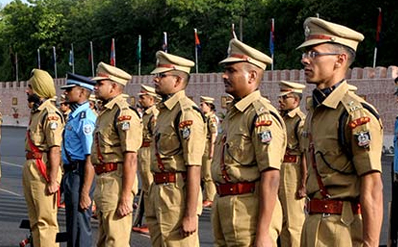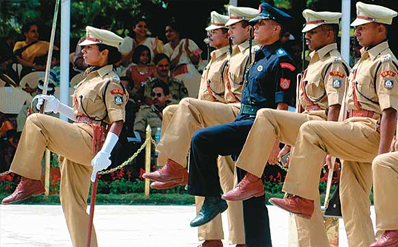Indian Police Service
The Indian Police Service (IPS) constituted under Article 312 of the Constitution of India, is one of the three All India services, the other two being IAS and IFS. The Indian Police Service replaced the Indian (Imperial) Police in 1948, a year after India's Independence. IPS officers provide senior level leadership to Police Forces, both at the state and central level and also to the paramilitary forces (BSF, CISF, CRPF, ITPB, NSG and SSB). The Police Department, under the Ministry of Home Affairs is responsible for Cadre Control and policy decisions such as cadre structure, recruitment, training, cadre deputation, pay and allowances, and disciplinary matters of the IPS officers. The service is organised in 24 State Cadres and is reviewed after every five years. As on 31.12.2010, the Authorised strength of the IPS Officers stands at 4720.
Service Profile for Indian Police Service (IPS)
Overview
The Indian Police Service or IPS, is one of the three All India Services of the Government of India. In 1948, a year after India gained independence from Britain, the Indian (Imperial) Police, was replaced by the Indian Police Service. The First Police Commission, appointed on 17 August 1865, contained detailed guidelines for the desired system of police in India and defined the police as a governmental department to maintain order, enforce the law, and to prevent and detect crime. The Indian Police Service is not a force itself but a service providing leaders and commanders to staff the state police and all-India Central Armed Police Forces. Its members are the senior officers of the police.
 Training
Training All the officers of Indian Police Service undergo probationary training at Lal Bahadur Shastri National Academy of Administration, Mussoorie and Sardar Vallabhbhai Patel National Police Academy, Hyderabad. After successful completion of probation, officers are confirmed in the service. Also, there is provision for mandatory Mid Career Training for IPS officers spread across the entire service span.
 Allocation of Cadre
Allocation of Cadre Successful candidates of Civil Services Examination allocated to the Indian Police Service are allocated to State Cadres/ Joint Cadres on the basis of their rank, preference and availability of vacancies in their category at their turn in terms of provisions of Cadre Allocation Policy of 2008 as amended from time to time. Officers recruited through promotions from State Police Services remain in their State Cadres.
Appointments to other Organizations / Bodies
IPS officers can be appointed in autonomous organizations/ sub-ordinate organizations/ PSUs/ UN Organizations/ International Organizations in various capacities. They can also serve as Personal Secretaries to Ministers in Central Government. A large number of senior posts in Central Armed Paramilitary Forces (viz, CRPF, CISF, BSF, SSB, ITBP, NSG), besides CBI, IB, RAW, etc are manned by IPS officers. Procedures governing Promotions IPS officers are eligible for raise in salary and promotions in their career span. The promotions take place after evaluating the performance on the basis of Annual Performance Appraisal Reports, Vigilance Clearance and scrutiny of overall record of the officer.